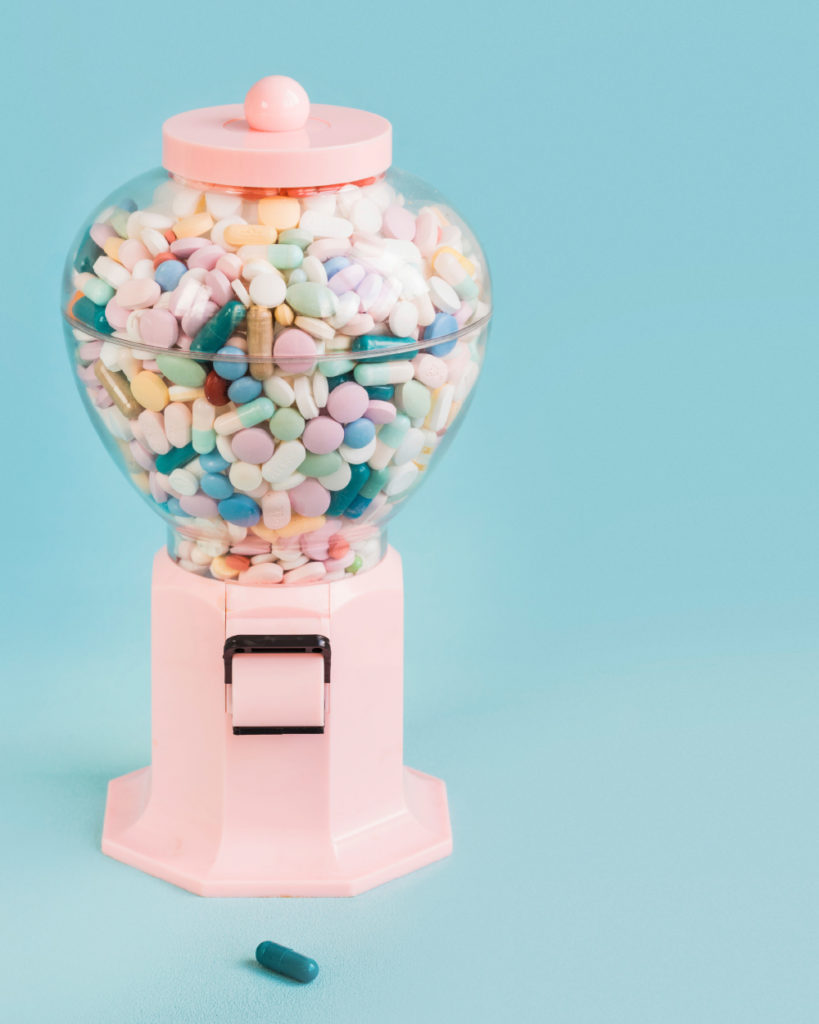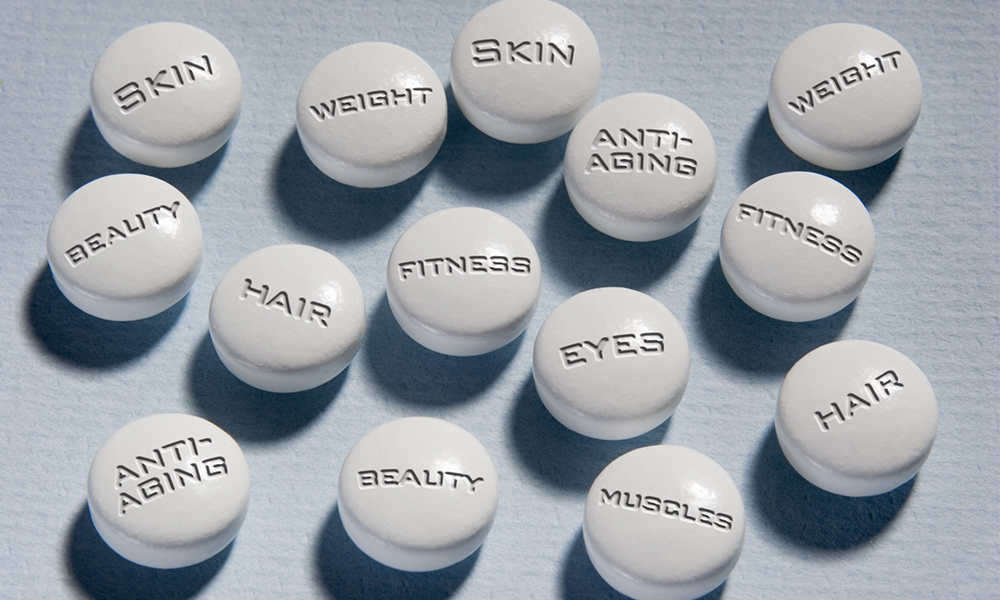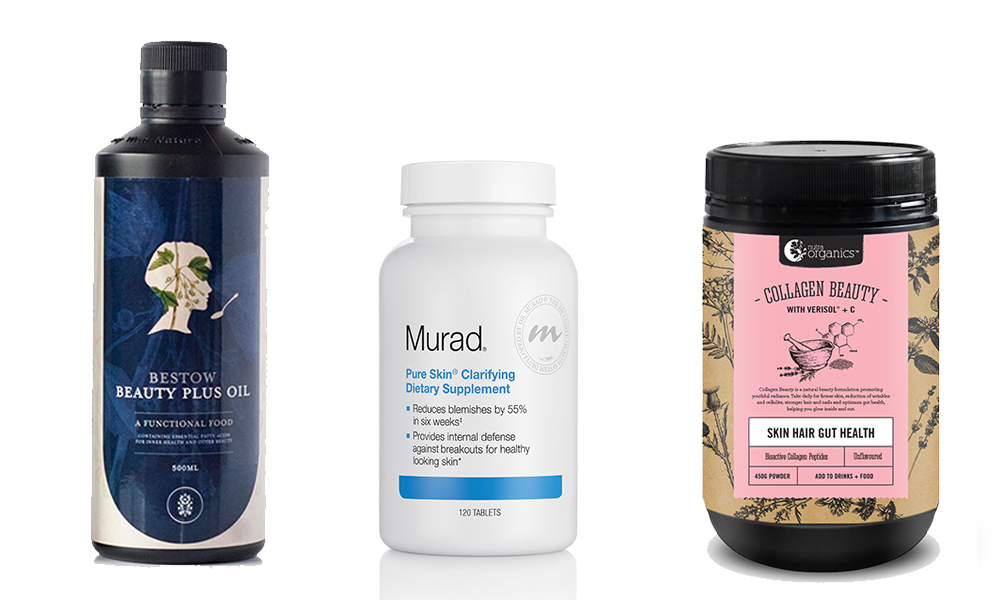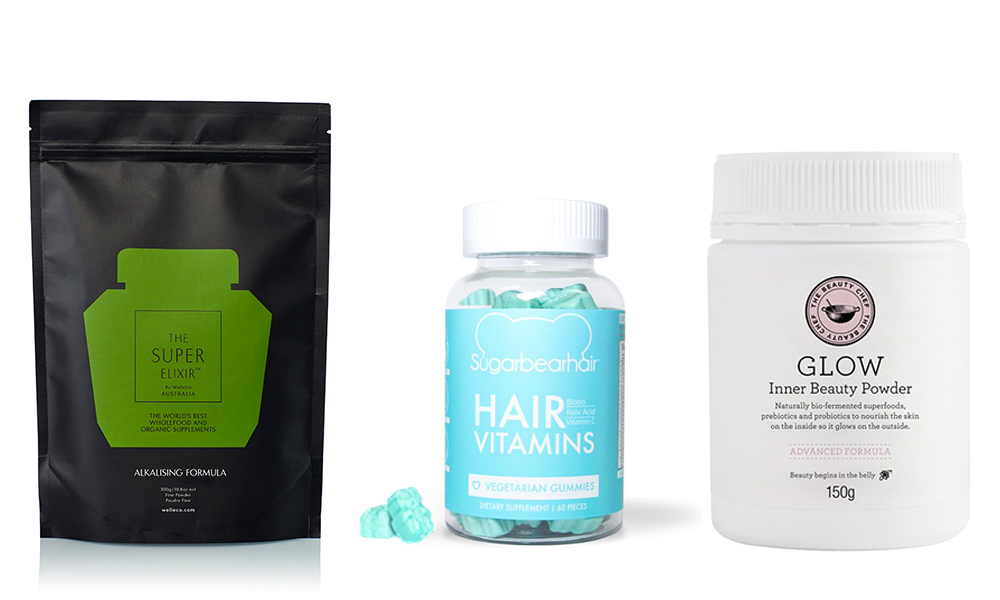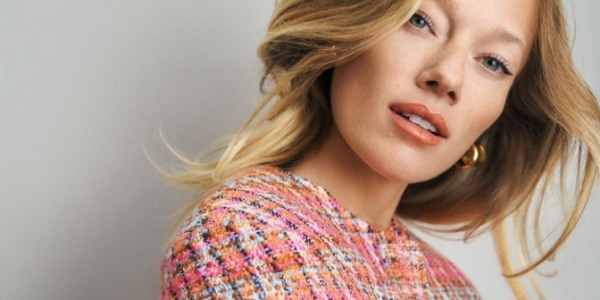Feeling or looking a bit blah? You might want to try some next-gen beauty supplements.
Whereas the skincare industry is generally focused on treating our skin from the outside in (and no complaints there, we’ll take it!), there’s no disputing that what we ingest (or don’t ingest) plays an even bigger part in how we look.
So when did we forget to prioritise a balanced diet, rather than clicking ‘add to cart’ in the pursuit of a healthy body and a glowing complexion? When life got in the way, that’s when.
You can consume all the smoothie bowls, bone broth and turmeric shots you like, but sometimes you’ll still be lacking the goods for boosting beautification. It’s what the makers of the new breed of nutritional supplements are betting on, blending the worlds of wellness and beauty into easily poppable pills and soluble powders cased in hip packaging and just as likely to be available at discerning cosmetics counters (or even clothing boutiques) as health stores.
Aiming to deliver youthful, radiant and resilient skin, as well as lush locks, there are many supplements that have people raving about their effects — although it has to be said that there are few large-scale clinical trials to back up the appealing claims, and we all know a quick-fix miracle pill does. not. exist.
But if you’re willing to give them a go, (and have supreme patience — there’s very little instant gratification here), many of the new arrivals may go some way towards making up for any nutritional shortfall in your diet that could be having an impact on the health of your skin or the growth of your hair.
What are beauty supplements?
These supplements are made up of vitamins, minerals and high-quality extracts designed to improve your skin and/or hair either directly or as an added bonus alongside other health and wellness benefits.
“When people are nutritionally depleted, it’s often reflected in the quality of their skin, hair and nails, because the body will prioritise the use of nutrients for more important organs in the body,” says Jo Fountain, a naturopath at Auckland’s Tonic Room. “We look for ingestible products that can reduce inflammation, oxidation and glycation and[other cellular processes] that damage our skin. This means taking care of our gut, detoxification pathways and hormonal health.”
Collagen FTW
Collagen (the main structural protein found in skin), is kind of a big-deal supplement right now, and can have bovine (cow) or marine (generally the scales, skin and bones of fish) origins. It sounds a bit gross, but it’s easily absorbed and has good ‘bioavailabity’, meaning your body can use it stat.
According to Ema Harrison of Nutra Organics, taking a collagen supplement doesn’t mean you’re adding more to your stores — you’re providing your body with the tools to make more of its own.
“Our skin is made of over 75% collagen, which starts to degenerate in our 20s. This is also accelerated by lifestyle factors, like sun exposure, poor diet, hormones, smoking and alcohol. When we take a collagen supplement, the body doesn’t assimilate the collagen we ingest, but rather it works as a signalling protein, increasing our own collagen production to promote youthful radiance, positively influence the skin’s structure, counteract ageing, reduce cellulite, improve the skin’s appearance and smooth it from within.”
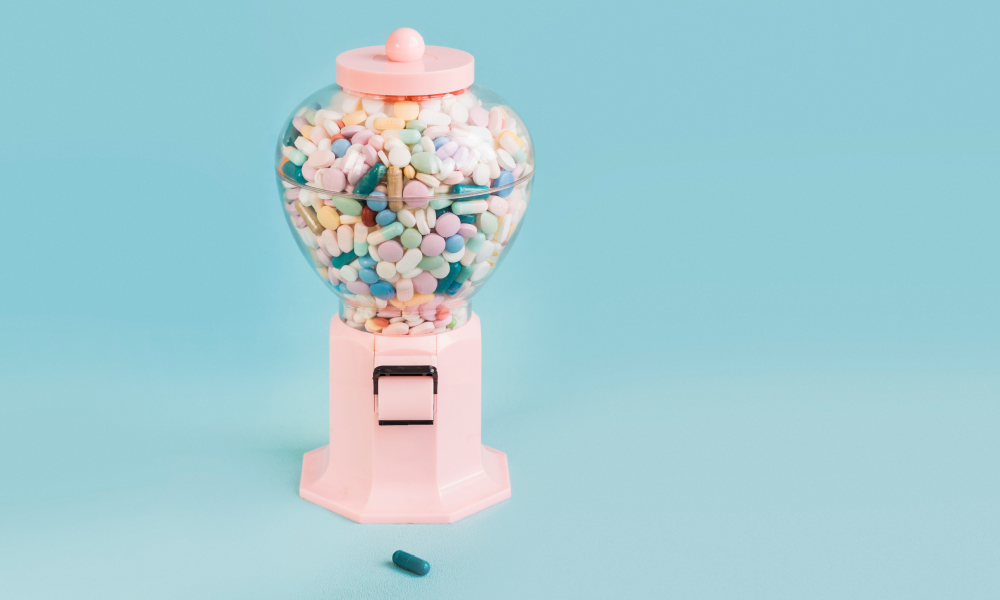
Another major wellness trend tips gut health as the crucial factor behind myriad issues — one of them being our skin’s appearance. Ema agrees.
“The gut is largely where our immune system resides and is where over 70% of our serotonin [a ‘happy’ hormone] is made. Collagen provides the necessary building blocks to restore and repair the gut lining, keeping our immune system strong and increasing our overall wellbeing.”
It’s also the reason pre- and probiotics turn up in many beauty supplements, along with superfoods (acai, kale, kelp, turmeric, pomegranate…), herbs, vitamins, protein, and nut and plant oils.
But what if I eat pretty well?
“Nothing will ever replace a nutrient-dense diet, but in times of stress we tend to require higher levels of certain nutrients,” says Jo. “No diet can ever be perfect. The latest research states that for optimal health we really need to consume nine servings of vegetables and fruit per day, and this can be difficult for people to achieve.”
With so many of us now in the know, gone are the days of us settling for basic-b***h vitamins that have low concentrations of the good stuff and are packed out with unnecessary fillers. We’re now demanding cleaner, more effective supplements, so why not give them a rebrand with sleek packaging and placement too? If they’re going to make our skin smoother and our hair more lush as well — bonus!
Where can you find beauty supplements?
Many international beauty stockists are now carrying so many supplements they’re becoming their own category. Case in point: the US Sephora site currently offers more than 70 ingestible products, including hot-selling hair supplements from Ouai, created by the Kardashians’ hairstylist Jen Atkin. Even Net-a-Porter has an assortment in its beauty category.
Back home, you can buy them from clothing boutique Superette, which stocks big player Welleco’s The Super Elixir and an Australian brand called Tonik that focuses on digestive health. Auckland’s Tonic Room exemplifies the modern health destination, with naturopaths, holistic facials and massage offered alongside health and beauty products. You’re increasingly just as likely to find similar items in boutique supermarkets as you are the usual health stores.
So are there any downsides to beauty supplements?
As with anything you ingest, you should always read the ingredients list carefully, particularly if you’re taking medication prescribed by a doctor. If that’s the case, you should check with your GP before you take anything new, to ask about any possible conflicts.
Dietary supplements sold in New Zealand are regulated under the Dietary Supplements Regulations 1985, which fall under the Food Act 2014. That’s some comfort, however, studies are being conducted all the time, and some new ingredients might not be extensively researched, so it’s wise to do some reading so you know what you’re taking.
Scroll for Miss FQ’s picks:


